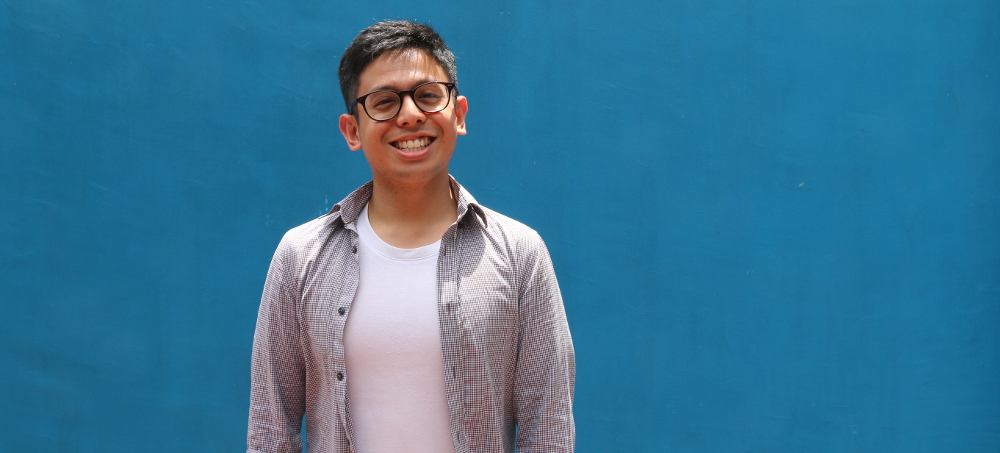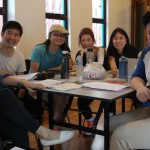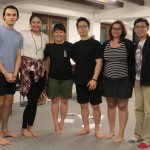Say hello to The Second Breakfast Company, a young theatre collective comprising five under-25-year-olds who were all previously members of Yellow Chair Productions. The group has chosen to make its debut with Leow Puay Tin’s 1996 play, Family, which just opened at Centre 42 to coincide with the play’s 20th anniversary. Centred on Mrs Yang, the iron-fisted matriarch of a family that immigrated to Singapore in search of a better life, the story features 34 characters across four generations. It’s an ambitious choice for any company, let alone a newly-minted one, but the group is passionate about the story and determined to try and do it justice. Find out more about both the company and the play from Second Breakfast’s artistic director, 24-year-old Adeeb Fazah.
Firstly, tell us a how The Second Breakfast Company came about.
I was previously at Yellow Chair Productions and it’s all going well. Then one day we decided to reconsider what our direction was as a community theatre group in Singapore, and we decided that structurally it would make more sense if we focus more on the community aspect of building people and talent in the theatre. To do that, Shaiful [Mohamad, artistic director of Yellow Chair] assembled five of us from within the company – a designer, two producers, one production manager, and myself, who’s one of the director-actors – and took us out to form our group. From there, the five of us spent one year figuring out what direction we wanted to go in, as well as what we aim to do as young practitioners in Singapore. We took on small projects, free projects, and worked with people we already knew. We had some work opportunities with the National Library Board for the National Reading Movement, and we registered ourselves officially with ACRA – the Accounting and Corporate Regulatory Authority – in June this year. And so here we are, doing our first production!
Where did the name Second Breakfast come from? Is it a Lord of the Rings reference to the Hobbits’ second meal of the day?
Yes it is! So the direction we went with after that year-long process was to serve up familiar things for a second time, but with a fresh take. So from the Singapore canon, it’s about reimagining these works, and same with Western classics. And even if we decide to stage original stuff in the future, we will still discuss the same topics that people are always talking about, but we’ll give it a new spin. So in a way the name worked because we liked the reference [to The Lord of the Rings], but also it’s about giving you as an audience member the second dishing of this familiar thing, and from a new perspective.
Why did you decide to focus on restaging classic works?
Because we think that there is an untapped of library of both Singaporean and Western works that people are unfamiliar with, especially for our target audience – youths and young adults. What we’re looking at is to give them a taste of literary works that they may not have heard of, that are beyond your usual household names like Haresh Sharma and all that.
So, building on that, what do you hope the company will bring to the local theatre scene?
We have three pillars for the company: the reimagining of existing classics, the reinvention of current ideas through original works, and the revival of the Singapore canon. We want our audience to be exposed to different literary works that already exist. But also, for us, it’s about bringing younger people into the discussions and conversations. We want to give them ideas to think about and apply to their own lives. Because I think it’s one thing to be, like, “okay this is Shakespeare” or whatever, but it’s another thing for them to be able to relate to it. So we would like to add that layer as well. For our first show, we gave out free tickets to schools to entice younger audiences to come in. We’re also doing post-show talks to educate them about what opportunities there are outside of their school’s drama club, and how to explore the platform of theatre as playwrights, directors, producers, or crew on the technical side.
Let’s talk about Family – why did you decide to stage this work as your first play?
A couple of reasons. I think Family spoke out to us first and foremost as a great play. It’s one of the plays that we found when we ransacked the libraries’ local sections, because we knew we wanted to do something local. And for us, Family had the balance between being something that’s part of the Singapore canon, and something that could still be very relevant thematically today.
It’s not an easy work to stage, especially as your debut production. What are some of the challenges that you’ve had to overcome?
Well, because it’s such an immense piece of work, we decided to bring in a big cast – we have 11 people. And I guess we were crazy to do that, because along the way we felt all these challenges of having a big cast in terms of logistics and all that. Apart from that, the thing with the text is that it’s the product of a devising process, and there’s this intentional ambiguity in the way that [the story] is told in the script. It leaves the reader to their own devices, to come up with their own storyscape, dreamscape, and landscape. And because there’s so much that Leow Puay Tin packs into the writing, but there’s so little stage directions, there’s so much you can do, and so many ways that you can stage it. That’s why I didn’t think that it’s too bad that Lasalle just staged it last year, because I think there’s always something fresh to bring to it.
Have you watched any of the previous productions of the play?
No, I haven’t. I was four years old when it was first staged by Ong Keng Sen in Chinatown in 1996, and then I was overseas when they did it at Lasalle, which is a shame. But my producers went to see it, and I think the work evolves over time – as with any other text – so I’m quite excited to bring this new staging to people.
Why did you pick Centre 42 as the venue for this to be staged?
We thought that Centre 42 is a very nice, cosy place, and it sort of feels like as an audience member, I’m going to someone’s house, and going up to the stairs to join the party. [We’ve done a lot of shows at the Drama Centre Black Box with Yellow Chair], but the Centre 42 Black Box is even more intimate. Audiences will be sat on three sides, so the action is really in your face. I think that brings them right into the household, and it brings them to a place where they have no choice but to empathise with all the characters, whether they like it or not. And of course, [we also had to find a place that fits our requirements, as] the perennial question of budget is always on our minds.
What are some of the things that you learnt by working on this production?
I think it was a bit of a crazy decision to go with Family as our first production, and I can’t lie about having had to force myself to scale down on a lot of the ideas that I initially had. Because creativity is one thing, but it has to be realistically put out within the means of whatever resources we can get. It has been very challenging, because I had all of these ideas in my mind, but we couldn’t do this and we couldn’t do that, so how then can we still tell the same story in the same way, but without the frills? That was the challenge I set for myself. And that’s why the stage right now is quite bare, with just one or two pieces of furniture.
And finally, we know you’re up to your neck with Family, but have you also thought about where The Second Breakfast Company will go next?
You know, we’ve had ideas here and there, but we haven’t had time to concretise anything yet, but we do plan to do another main season production next year, and possibly a proper play reading somewhere. To be announced!
Interview by Gwen Pew
Find out more about Family here, and catch the show at Centre 42 from 13 – 16 October 2016.






